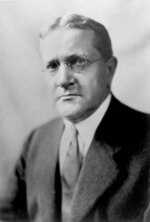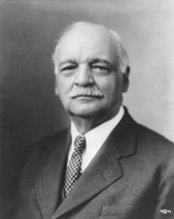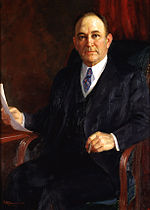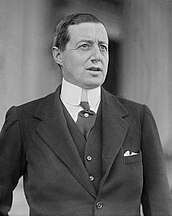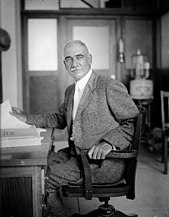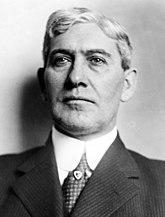70th United States Congress
| 70th United States Congress | |
|---|---|
69th ← → 71st | |
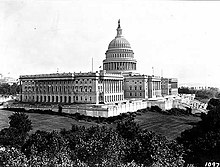 United States Capitol (1906) | |
March 4, 1927 – March 4, 1929 | |
| Members | 96 senators 435 representatives 5 non-voting delegates |
| Senate majority | Republican (with tie-breaking VP) |
| Senate President | Charles G. Dawes (R) |
| House majority | Republican |
| House Speaker | Nicholas Longworth (R) |
| Sessions | |
| 1st: December 5, 1927 – May 29, 1928 2nd: December 3, 1928 – March 3, 1929 | |
The 70th United States Congress was a meeting of the legislative branch of the United States federal government, consisting of the United States Senate and the United States House of Representatives. It met in Washington, D.C., from March 4, 1927, to March 4, 1929, during the last two years of Calvin Coolidge's presidency. The apportionment of seats in the House of Representatives was based on the 1910 United States census.
Both chambers had a Republican majority - albeit reduced from the previous Congress - and along with President Coolidge, the Republicans maintained an overall federal government trifecta.[1]
Major events
- November 6, 1928: U.S. Senate elections and U.S. House elections

- This was the last Congress to be exclusively white and the last to not have a single black member of Congress in either chamber.
Major legislation
- March 10, 1928: Settlement of War Claims Act
- May 15, 1928: Flood Control Act of 1928 (Jones–Reid Act)
- May 22, 1928: Merchant Marine Act of 1928 (Jones–White Act)
- May 22, 1928: Forest Research Act (McSweeney–McNary Act)
- May 22, 1928: Capper–Ketcham Act
- May 28, 1928: Welsh Act
- May 29, 1928: Revenue Act of 1928, ch. 852, 45 Stat. 791
- May 29, 1928: Reed–Jenkins Act
- December 21, 1928: Boulder Canyon Project Act (Hoover Dam)
- December 22, 1928: Color of Title Act
- January 19, 1929: Hawes–Cooper Act
- February 18, 1929: Migratory Bird Conservation Act (Norbeck–Anderson Act), ch. 257, 45 Stat. 1222
- February 25, 1929: Mount Rushmore National Memorial Act (Norbeck-Williamson Act of 1929)
- March 2, 1929: Increased Penalties Act (Jones–Stalker Act)
Party summary
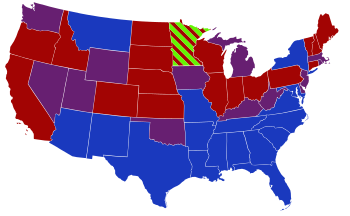
The count below identifies party affiliations at the beginning of the first session of this Congress, and includes members from vacancies and newly admitted states, when they were first seated. Changes resulting from subsequent replacements are shown below in the "Changes in membership" section.
Senate
At the end of the first month of the first session of Congress, Republicans gained control of the Senate through a VP-tie-breaking majority.
| Affiliation | Party (Shading indicates majority caucus) |
Total | |||
|---|---|---|---|---|---|
| Democratic | Farmer- Labor |
Republican | Vacant | ||
| End of previous Congress | 42 | 1 | 52 | 95 | 1 |
| Begin | 47 | 1 | 46 | 94 | 2 |
| December 20, 1927 | 46 | 93 | 3 | ||
| December 29, 1927 | 47 | 94 | 2 | ||
| March 23, 1928 | 45 | 93 | 3 | ||
| March 30, 1928 | 46 | 92 | 4 | ||
| March 31, 1928 | 47 | 93 | 3 | ||
| April 4, 1928 | 46 | 94 | 2 | ||
| June 24, 1928 | 46 | 93 | 3 | ||
| June 30, 1928 | 47 | 94 | 2 | ||
| December 3, 1928 | 48 | 95 | 1 | ||
| December 9, 1928 | 47 | 94 | 2 | ||
| December 10, 1928 | 48 | 95 | 1 | ||
| December 15, 1928 | 45 | 49 | 95 | 1 | |
| Final voting share | 47.4% | 1.1% | 51.6% | ||
| Beginning of the next Congress | 39 | 1 | 54 | 94 | 2 |
House of Representatives
| Party (shading shows control) |
Total | Vacant | ||||
|---|---|---|---|---|---|---|
| Democratic (D) |
Farmer– Labor (FL) | Republican (R) | Socialist (S) |
|||
| End of previous congress | 182 | 3 | 246 | 2 | 433 | 2 |
| Begin | 194 | 2 | 237 | 1 | 434 | 1 |
| End | 193 | 232 | 428 | 7 | ||
| Final voting share | 45.1% | 0.5% | 54.2% | 0.2% | ||
| Beginning of next congress | 164 | 1 | 268 | 0 | 433 | 2 |
Leadership
Senate
Majority (Republican) leadership
- Majority Leader: Charles Curtis
- Majority Whip: Wesley L. Jones
- Republican Conference Secretary: Frederick Hale
- National Senatorial Committee Chair: Jesse H. Metcalf
Minority (Democratic) leadership
- Minority leader: Joseph T. Robinson
- Minority whip: Peter G. Gerry
- Democratic Caucus Secretary: Hugo Black
House of Representatives
Majority (Republican) leadership
- Majority Leader: John Q. Tilson
- Majority Whip: Albert Vestal
- Republican Conference Chairman: Willis C. Hawley
- Republican Campaign Committee Chairman: William R. Wood
Minority (Democratic) leadership
- Minority Leader: Finis J. Garrett
- Minority Whip: William Allan Oldfield
- Democratic Caucus Chairman: Arthur H. Greenwood
- Democratic Campaign Committee Chairman: Joseph W. Byrns Sr.
Members
This list is arranged by chamber, then by state.
Senate
Senators are listed by class. They were elected every two years, with one-third beginning new six-year terms with each Congress. Preceding the names in the list below are Senate class numbers, which indicate the cycle of their election. In this Congress, Class 1 meant their term ended with this Congress, requiring re-election in 1928; Class 2 meant their term began in the last Congress, requiring re-election in 1930; and Class 3 meant their term began with this Congress, requiring re-election in 1932.
House of Representatives
Members of the House of Representatives are listed by district.
Changes in membership
The count below reflects changes from the beginning of the first session of this Congress.
Senate
| State (class) |
Vacated by | Reason for change | Successor | Date of successor's formal installation[c] |
|---|---|---|---|---|
| Pennsylvania (3) |
Vacant | Election of William S. Vare was not certified by the governor and the Senate refused to seat him. | Vacant | Seat remained vacant until the next Congress. |
| Illinois (3) |
Vacant | Senator-elect Frank L. Smith was not permitted to qualify and resigned February 9, 1928. Successor elected November 6, 1928. |
Otis F. Glenn (R) | December 3, 1928 |
| New Mexico (1) |
Andrieus A. Jones (D) | Died December 20, 1927. Successor appointed December 29, 1927. Successor was later not elected to finish the term, see below. |
Bronson M. Cutting (R) | December 29, 1927 |
| Michigan (1) |
Woodbridge N. Ferris (D) | Died March 23, 1928. Successor appointed March 31, 1928. Successor was then elected November 6, 1928, to finish the term. |
Arthur H. Vandenberg (R) | March 31, 1928 |
| Ohio (3) |
Frank B. Willis (R) | Died March 30, 1928. Successor appointed April 4, 1928. Successor was later not elected to finish the term, see below. |
Cyrus Locher (D) | April 4, 1928 |
| Idaho (3) |
Frank R. Gooding (R) | Died June 24, 1928. Successor was appointed to continue the term. Successor was then elected November 6, 1928, to finish the term. |
John Thomas (R) | June 30, 1928 |
| New Mexico (1) |
Bronson M. Cutting (R) | Appointee did not run to finish the term. Successor elected November 6, 1928. |
Octaviano A. Larrazolo (R) | December 7, 1928 |
| Ohio (3) |
Cyrus Locher (D) | Appointee lost nomination to finish term. Successor elected November 6, 1928. |
Theodore E. Burton (R) | December 15, 1928 |
| Delaware (2) |
T. Coleman du Pont (R) | Resigned December 9, 1928. Successor appointed December 10, 1928, to finish the term. |
Daniel O. Hastings (R) | December 10, 1928 |
House of Representatives
- Replacements: 15
- Democratic: 1 seat net gain
- Republican: 1 seat net loss
- Deaths: 16
- Resignations: 7
- Total seats with changes: 23
| District | Vacated by | Reason for vacancy | Successor | Date of successor's installation |
|---|---|---|---|---|
| Ohio 2nd | Vacant | Rep. Ambrose E. B. Stephens died during previous congress | Charles Tatgenhorst Jr. (R) | November 8, 1927 |
| Louisiana 7th | Ladislas Lazaro (D) | Died March 30, 1927 | René L. De Rouen (D) | August 23, 1927 |
| New York 35th | Walter W. Magee (R) | Died May 25, 1927 | Clarence E. Hancock (R) | November 8, 1927 |
| Colorado 1st | William N. Vaile (R) | Died July 2, 1927 | S. Harrison White (D) | November 15, 1927 |
| Oregon 3rd | Maurice E. Crumpacker (R) | Died July 24, 1927 | Franklin F. Korell (R) | October 18, 1927 |
| Pennsylvania 1st | James M. Hazlett (R) | Resigned October 20, 1927 | James M. Beck (R) | November 8, 1927 |
| Iowa 9th | William R. Green (R) | Resigned March 31, 1928, after being appointed to the United States Court of Claims | Earl W. Vincent (R) | June 4, 1928 |
| Massachusetts 12th | James A. Gallivan (D) | Died April 3, 1928 | John W. McCormack (D) | November 6, 1928 |
| Illinois 1st | Martin B. Madden (R) | Died April 27, 1928 | Seat remained vacant until next Congress | |
| New York 32nd | Thaddeus C. Sweet (R) | Died May 1, 1928 | Francis D. Culkin (R) | November 6, 1928 |
| Pennsylvania 8th | Thomas S. Butler (R) | Died May 26, 1928 | James Wolfenden (R) | November 6, 1928 |
| Oregon 2nd | Nicholas J. Sinnott (R) | Resigned May 31, 1928, after being appointed to the United States Court of Claims | Robert R. Butler (R) | November 6, 1928 |
| Illinois at-large | Henry R. Rathbone (R) | Died July 15, 1928 | Seat remained vacant until next Congress | |
| Philippines at-large | Isauro Gabaldon | Resigned July 16, 1928, after being nominated for election to the Philippine House of Representatives | Seat remained vacant until next Congress | |
| Alabama 5th | William B. Bowling (D) | Resigned August 16, 1928, after being appointed judge of the 5th Judicial Circuit of Alabama | LaFayette L. Patterson (D) | November 6, 1928 |
| Massachusetts 14th | Louis A. Frothingham (R) | Died August 23, 1928 | Richard B. Wigglesworth (R) | November 6, 1928 |
| Missouri 16th | Thomas L. Rubey (D) | Died November 2, 1928 | Seat remained vacant until next Congress | |
| Arkansas 2nd | William Allan Oldfield (D) | Died November 19, 1928 | Pearl Peden Oldfield (D) | January 9, 1929 |
| Ohio 22nd | Theodore E. Burton (R) | Resigned December 15, 1928, after winning special election to the U.S. Senate | Seat remained vacant until next Congress | |
| New York 41st | Clarence MacGregor (R) | Resigned December 28, 1928, after being appointed to the New York Supreme Court | Seat remained vacant until next Congress | |
| Missouri 4th | Charles L. Faust (R) | Died December 17, 1928 | David W. Hopkins (R) | February 5, 1929 |
| Illinois 15th | Edward J. King (R) | Died February 17, 1929 | Seat remained vacant until next Congress | |
| New York 21st | Royal H. Weller (D) | Died March 1, 1929 | Seat remained vacant until next Congress | |
Committees
Lists of committees and their party leaders for members of the House and Senate committees can be found through the Official Congressional Directory at the bottom of this article. The directory after the pages of terms of service lists committees of the Senate, House (Standing with Subcommittees, Select and Special) and Joint and, after that, House/Senate committee assignments. On the committees section of the House and Senate in the Official Congressional Directory, the committee's members on the first row on the left side shows the chairman of the committee and on the right side shows the ranking member of the committee.
Senate
|
House of Representatives
|
Joint committees
- Conditions of Indian Tribes (Special)
- Disposition of (Useless) Executive Papers
- Harriman Geographic Code System
- Investigation of Northern Pacific Railroad Land Grants
- Determine what Employment may be Furnished Federal Prisoners (Chairman: Rep. George S. Graham)
- Investigate Northern Pacific Lands (Chairman: Rep. Nicholas J. Sinnott)
- The Library (Chairman: Sen. Simeon D. Fess)
- Printing (Chairman: Sen. George H. Moses)
- Taxation (Chairman: Rep. William R. Green)
- To Investigate the Salaries of Officers and Employees of the Senate and the House
Caucuses
- Democratic (House)
- Democratic (Senate)
Officers
Legislative branch agency directors
- Architect of the Capitol: David Lynn
- Attending Physician of the United States Congress: George Calver, from 1928
- Comptroller General of the United States: John R. McCarl
- Librarian of Congress: Herbert Putnam
- Public Printer of the United States: George H. Carter
Senate
- Chaplain: John J. Muir, (Baptist), until December 5, 1927
- ZeBarney T. Phillips (Episcopal), from December 5, 1927
- Secretary: Edwin P. Thayer
- Librarian: Edward C. Goodwin
- Sergeant at Arms: David S. Barry
House of Representatives
- Chaplain: James S. Montgomery (Methodist)
- Clerk: William T. Page
- Doorkeeper: Bert W. Kennedy
- Reading Clerks: Patrick Joseph Haltigan (D) and Alney E. Chaffee (R)
- Sergeant at Arms: Joseph G. Rodgers
- Parliamentarian: Lewis Deschler, from 1928
- Postmaster: Frank W. Collier
See also
- 1926 United States elections (elections leading to this Congress)
- 1928 United States elections (elections during this Congress, leading to the next Congress)
Notes
- ^ Frank L. Smith (R-IL) was elected to the Senate for the term starting March 4, 1927, but the Senate refused to qualify him due to charges of corruption concerning his election. He resigned February 9, 1928.[2]
- ^ William S. Vare (R-PA) was elected to the Senate for the term starting March 4, 1927, but the Senate refused to qualify him due to charges of corruption and fraud concerning his election. In the next Congress, the Senate unseated him.[3]
- ^ When seated or oath administered, not necessarily when service began.
References
- ^ Macmahon, Arthur W. (1929). "Second Session of the Seventieth Congress". American Political Science Review. 23 (2): 364–383. doi:10.2307/1945219. ISSN 0003-0554.
- ^ "Bioguide Search".
- ^ "Bioguide Search".
- Martis, Kenneth C. (1989). The Historical Atlas of Political Parties in the United States Congress. New York: Macmillan Publishing Company.
- Martis, Kenneth C. (1982). The Historical Atlas of United States Congressional Districts. New York: Macmillan Publishing Company.
External links
- Biographical Directory of the U.S. Congress
- U.S. House of Representatives: House History
- U.S. Senate: Statistics and Lists
- Official Congressional Directory for the 70th Congress, 1st Session. 1927.
- Official Congressional Directory for the 70th Congress, 1st Session (Revision). 1928.
- Official Congressional Directory for the 70th Congress, 2nd Session. 1928.
- "Official Congressional Directory for the 70th Congress, 2nd Session (Revision)". Congressional Directory. 1927/1929- : S. Pub. 1887.


